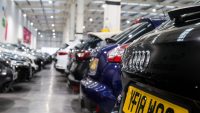Tesla boss Elon Musk’s proposal to buy Twitter and take it private has hit a stumbling block as the social media network adopts a ‘poison pill’ defence.
Twitter said yesterday (Friday) that its board of directors had unanimously adopted the defence which would allow existing shareholders to buy additional stock at a discount.
The move would dilute Musk’s stake in the company and make it harder for him to convince a majority of shareholders to vote in favour of his acquisition.
Twitter’s plan would take effect if Musk’s near nine per cent stake grows to 15 per cent or more.
The defence – formally called shareholder rights plans – are used to prevent the takeover of a firm by making any bid prohibitively expensive.
While it could put off Musk, the world’s richest man could still take over the company by waging a ‘proxy fight’ in which shareholders vote to retain or dismiss the company’s current directors.
Twitter said the poison pill would enable its investors to ‘realise the full value of their investment’ by reducing the likelihood that any one person can gain control of the company without either paying shareholders a premium or giving the board more time to evaluate their offer.
Twitter revealed in a securities filing on Thursday that Musk offered to buy the company outright for more than $43bn.
He said the social media platform ‘needs to be transformed as a private company’ in order to build trust with its users.
Musk said: ‘I believe free speech is a societal imperative for a functioning democracy.
‘I now realise the company will neither thrive nor serve this societal imperative in its current form.
‘Having a public platform that is maximally trusted and broadly inclusive is extremely important to the future of civilisation.’
Twitter offered Musk a seat on its board when he announced his stake on the condition that he would limit his purchases to no more than 14.9 per cent of the company’s outstanding stock. But Musk declined.
Daniel Ives, an analyst for Wedbush Securities, said: ‘They’re gearing up for a battle here with Musk.
‘They also have to give themselves time to try to find another potential buyer.’
Ives added that Twitter’s poison pill path is a predictable defensive manoeuvre but could be seen as a ‘sign of weakness’ on Wall Street.
- More Musk:
- Musk launches £32bn bid to become outright owner of Twitter
- Musk buys 9.2 per cent stake in Twitter
- Tesla boss announces wave of new products and dedicated ‘robotaxi’
- Tesla opens first European Gigafactory
- Tesla recalls 580,000 cars over ‘Boombox’ feature
What is Twitter’s ‘poison pill’ supposed to do?
The ingredients of each poison pill vary, but they are all designed to give corporate boards an option to flood the market with so much newly created stock that a takeover becomes prohibitively expensive.
The strategy was popularised back in the 1980s when publicly held companies were being stalked by corporate raiders, now more frequently described as ‘activist investors’.
Twitter did not disclose the details of its poison pill, but said it would provide more information in a forthcoming filing with the Securities and Exchange Commission, which the company delayed because public markets were closed yesterday.
The San Francisco company’s plan will be triggered if a shareholder accumulates a stake of 15 per cent or more. Musk, best known as CEO of electric car maker Tesla, currently holds around 9 per cent.
Can a poison pill be a negotiating ploy?
Although they are supposed to help prevent an unsolicited takeover, poison pills also often open the door to further negotiations that can force a bidder to sweeten the deal.
If a higher price makes sense to the board, a poison pill can simply be cast aside along with the acrimony it provoked, clearing the way for a sale to completed.
How did Elon Musk react to Twitter’s announcement?
Musk, a prolific tweeter with 82m followers, had no immediate reaction to the company’s poison pill. But on Thursday he indicated he was ready to wage a legal battle.
‘If the current Twitter board takes actions contrary to shareholder interests, they would be breaching their fiduciary duty,’ Musk tweeted. ‘The liability they would thereby assume would be titanic in scale.’
Musk has publicly said that his bid is his best and final offer for Twitter, but other corporate suitors have made similar statements before ultimately upping the ante.
With an estimated fortune of $265bn dollars, Musk would seem to have deep enough pockets to raise his offer, although he is still working out how to finance the proposed purchase.
How has this defence worked in the past?
Takeover tussles often dissolve into gamesmanship that include poison pills and other schemes designed to make a buyout more difficult. That is what happened in one of the biggest and most drawn out takeover dances in Silicon Valley history.
After business software maker Oracle made an unsolicited $5.1bn offer for its smaller rival PeopleSoft in June 2003, the two companies spent the next 18 months fighting with each other.
As part of its defence, PeopleSoft not only adopted a poison pill that authorised the board to flood the market with more shares, it also created what it called a ‘customer assurance programme’.
That plan promised to pay customers five times the cost of their software licences if PeopleSoft was sold within the next two years, creating an estimated liability of up to $800m for an acquiring company.
PeopleSoft also got another helping hand when the US Department of Justice filed an antitrust lawsuit seek to block a takeover, although a judge ruled in Oracle’s favour.
Even though the company ended up selling to Oracle, PeopleSoft’s defence strategy paid off for its shareholders. Oracle’s final purchase price was $11.1bn — more than twice its original bid.
Additional reporting: PA Media, Associated Press


































